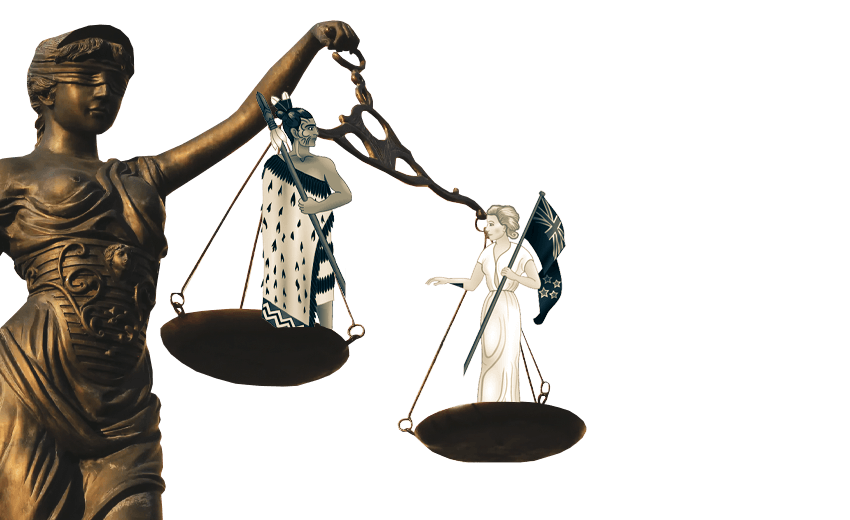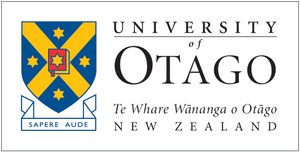OPINION: It is time to integrate tikanga Māori into law schools to create a truly bicultural legal system, writes University of Otago law professor Jacinta Ruru.
I see, hear, feel racism. Every day.
Each morning, I begin my trek from carpark to office, walking across the campus lawns, alongside the Ōwheo river (that everyone calls the Leith) on once thriving Ngāi Tahu lands. I see no acknowledgment of this. I wish I knew more. My heart weeps.
I brace myself. The entrance doors of the Richardson Building open, named in proud honour of Englishman, Sir John Richardson, born in 1810 to the son of a silk factory owner. A welcome placard informs me of what he looked like and what he did.
I exit the lift on the 8th floor. I glance to my left at the entrance to the Robert Stout Law Library, named in honour of Sir Robert Stout, the first lecturer in law at the University of Otago (1873-1876), who later became New Zealand’s attorney-general, premier and chief justice. A floor up, his eyes watch me as a I dare to go into the law faculty reception.
I know these colonial men were part of a regime that used law as a tool to colonise Māori, to steal and kill our lands, waters, fish, language. They were “firsts” in helping to create the colonial nation: New Zealand. I don’t necessarily begrudge their presence. I do begrudge that there is little counterweight.
I see, hear, feel this erasure of Ngāi Tahu and Māori more broadly from my place of work all the time. Not just in my physical surrounds, but in every little encounter. The law school curriculum, then and now, prioritises colonial law. The law school hierarchy and calendar prioritises Pākehā aspirations of what it means to be a successful law student.
On the margins, Māori sit. This is not unique to Otago’s law school – all law schools in Aotearoa New Zealand are similar: they entirely privilege Pākehā teaching and leadership. This is mostly true too for all law schools in once British colonies.
This month, I read Indigenous Cree law professor Jeffrey Hewitt’s published words with a strongly nodding head:
“Law schools produce legal actors and, through this production line, serve as a site of colonization because in Canada law has been, and continues to be, a vehicle to oppress Indigenous peoples. This has not prevented Indigenous peoples from entering law schools in Canada, learning about and practicing Canadian law, completed graduate degrees, and joining law faculties. Meanwhile, law schools have learned little about Indigenous legal orders. In sum, the presence of Indigenous peoples in law schools and on faculty does not equate to an end of the law school’s role in colonization.”
My eyes weep. There’s another way. There’s another choice.
In August, the Māori law scholars across all six of our law schools released a paper that encapsulates our dreams for the future: a bijural, bicultural, bilingual legal profession.
We desire positive transformation. We see, feel, hear change afoot outside of the university sector. We take heart that legislation is increasingly requiring decision-makers to act in accordance with Te Tiriti o Waitangi and the judiciary is gaining confidence in recognising tikanga Māori as part of our New Zealand law.
We ask for the tertiary sector to step up, to add to training students to work in a legal profession that meets modern day expectations. We call for a bijural legal education that presupposes the existence of two laws, and importantly Māori law founded on tikanga Māori, which is taught as a legitimate and continuing source and influence on the rights, obligations, rules and policy in Aotearoa New Zealand’s legal system.
Māori law can and should be taught as part of the multi-year core LLB curriculum in a manner that adheres to Māori transmission methods of knowledge. A curriculum that finds a place among the Western legal values to also give emphasis to tapu, mana, whanaungatanga, kaitiakitanga and utu.
We seek a bicultural legal education where new structures and processes are implemented that are grounded in Te Tiriti, including the employment of Māori, and sharing of resources, leadership and decision-making with iwi, hapū and Māori academic staff. Specific steps include:
-
-
- quality, structural relationships with the mana whenua with the intent of building greater collaboration for the teaching of Māori law;
- the recruitment and retention of high numbers of Māori teaching staff;
- a structure for ensuring Māori-led quality content in the compulsory and optional courses offered across the study years;
- shared decision-making authority and equitable access to financial resources with Māori staff in the faculty;
- financial support for the development of a bijural curriculum and its quality delivery; and
- recognition of the Māori epistemologies for teaching and instruction, such as wananga, pūrākau, the use of te reo Māori and the legal knowledge held by kaumātua.
-
We ask for right-shifting action towards providing an active bilingual legal education. Where law schools would utilise te reo Māori broadly in general teaching and specifically in relation to Māori law concepts and principles such that all students have a working knowledge of Māori law in te reo Māori at the time of graduation. Where students with te reo fluency are also able to easily learn and be assessed in te reo Māori.
To realise this, we need systemic change. It can be done.
My soul rejoices. With hope.
Strategically decolonising and Indigenising legal education is already underway in Canada and in development in Australia. Such changes are possible. Aotearoa New Zealand is well placed to catch up to these countries and accelerate our existing practices if the commitment is made in a deliberate formal manner with long-term significant resources made available.
Care will be required to progress this aspirational systemic change, especially in regard to ensuring mana whenua are supportive of these moves. The change should be Māori led and Māori designed, with substantial allied support from deans of law schools and the legal profession, including the judiciary, law practitioners, law academics and law students. Many of them are already supportive of this call.
We are excited about the possibilities for our country. We believe undergraduate legal education has an essential role in enabling the practice of Māori law as law in Aotearoa’s modern legal system. Our research project continues. Over the next 12 months, we will seek to understand the breadth of interest for this call for change.
I anticipate change on the near horizon – months, not decades – as our law schools, led by brave leaders, can acknowledge and enhance the legal education experience in Aotearoa New Zealand.
I hope that we can now start to build bridges to te ao Māori, pathways for all our students to learn, be inspired, and be culturally safe in their learning of the laws of Aotearoa. So that I too can be safe and inspired in my workplace.
Imagine for a moment, a bijural law library. Let’s keep the entrance door open to the Robert Stout Law Library with its more than 80,000 volumes of legal materials from New Zealand, Australia, the United Kingdom, Canada, and subscriptions to 70,000 electronic journals and databases. It’s an impressive and useful place to learn law.
But let’s create another room. A new door to walk through. One that takes us into the heart of Māori law, perhaps named the Māui-tikitiki Law Library. Instead of statute books, Māori forms of law would be shared – such as, art, tukutuku weaving, carvings and photos of our maunga, our awa, our tīpuna – to convey significant events in te ao Māori, for the purposes of exemplifying the values-based personified legal system. Bookshelves could hold writings about waiata, whakatauki, tikanga, history. Such a place would be an impressive and useful place to learn law too.
The erasure and silence of our Māori histories, knowledge, and laws is obvious, even to the casual visitor to our law schools. It was and is deliberate. But we can reverse this with steadfast action by adopting an and/and approach. The University of Otago is particularly dear to my heart. The University of Otago can do this.
This content was created in paid partnership with the University of Otago. Learn more about our partnerships here.

